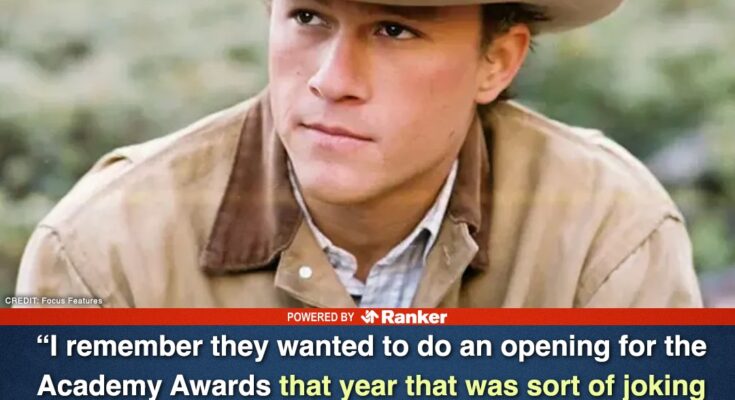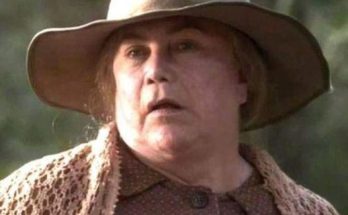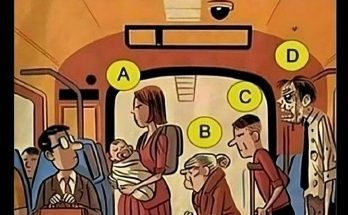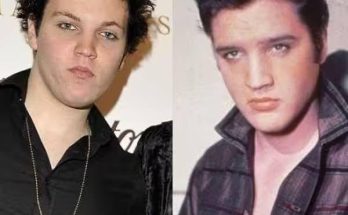Moviegoers have seen their fair share of controversial content in theaters over the past three decades. After all, the best films aren’t always the ones that simply provide entertainment value. Sometimes, they’re the ones that question societal values, push cultural norms, and highlight topics that seem taboo in everyday social circles.
Often, these movies that sparked backlash are relevant in content, despite (or because of) their questionable scenes. And while critics and audiences are quick to voice their unfiltered opinions on controversial movies, the actors who star in them don’t always get the opportunity to express their own feelings and experiences regarding the filming process. This collection reveals what actors had to say about some of the most notorious films they’ve starred in.
Heath Ledger Wouldn’t Tolerate Any Homophobic Jokes About ‘Brokeback Mountain’
When Brokeback Mountain hit box offices in 2005, the story of two men having a long affair while being married to other women was a controversial subject. Homophobic critics and audiences mocked the storyline and the actors. But Jake Gyllenhaal remembers the profound impact it had on some viewers, as well as on him and co-star Heath Ledger:
There were many jokes being made about the movie, or poking fun at, things like that. And [Ledger’s] consummate devotion to how serious and important the relationship between these two characters was — it showed me how devoted he was as an actor and how devoted we both were to the story and the movie…
Heath and I were at a Q&A… And I remember us joking backstage, and I remember us coming on to the stage in a humorous mode because we were just having fun with each other. We sat down, the lights came up, and a man stood up — and the movie had been out for a week and a half — and he said, “I just want to say, this is my 11th time seeing this movie, and I can’t stop watching it, and I just want to thank you all for making it.” And I thought, 11 times in 10 days… I remember the wash of that over us. We were poking fun at each other before we go on, and then the profound realization of — the profundity of this thing washed over us. It happens constantly to this day, and I can’t really express how proud I am of it.
Gyllenhaal recalls that Ledger had no tolerance for jokes at the film’s expense:
[T]hat’s the thing I loved about Heath… He would never joke. Someone wanted to make a joke about the story or whatever, he was like, “No. This is about love. Like, that’s it, man. Like, no.”
Gyllenhaal reiterated the point to Another Man magazine, saying:
I remember they wanted to do an opening for the Academy Awards that year that was sort of joking about it… And Heath refused. I was sort of at the time, “Oh, okay… whatever.” I’m always like, “It’s all in good fun.” And Heath said, “It’s not a joke to me – I don’t want to make any jokes about it.”
Jodie Foster Says Her ‘Taxi Driver’ Role Was More Uncomfortable For Everyone Else Than For Her
Depicting the life of a mentally unstable Vietnam veteran (Robert DeNiro) who protects a child sex-trafficking victim (Jodie Foster), Taxi Driver made audiences uncomfortable with its heavy subject matter. Some were particularly uncomfortable with the fact that Foster was a child herself (age 12) when she played the role. However, Foster said for her it was never that big of deal:
I don’t think it was uncomfortable for me; I think it was uncomfortable for other people, but it wasn’t really for me… I had been an actress for a long time, I had done a lot of movies before I did Taxi Driver. To me it was another role, and I understood the difference between making movies and actually being a person. So it wasn’t really impactful for me. I don’t think I was confused by the sexuality in the film…
I think the movie’s a really important movie… I’m really proud of it. Those girls existed, those girls exist, and female sexual slavery is something that we need to discuss — the complexity of it. So yeah, I felt pretty good about it.
The actor also recalled that director Martin Scorsese didn’t really know how to cue her as a young girl playing such a controversial role, and turned things over to De Niro:
Scorsese would say something like “unzip his fly” and just start laughing and not know what to do, so he would hand it over to Robert De Niro and then Robert would tell me what to do… And he was even more “Robert De Niro” then, even quieter and more strange.
Maria Schneider Felt Humiliated During ‘Last Tango In Paris’
Last Tango in Paris shocked audiences in 1973 when it showed a young woman being assaulted by an older man – very much against her will. Later, French actress Maria Shneider recalled that she was hesitant to join the project even before filming began, was mortified when the scene was suggested (she said it wasn’t in the original script), and was humiliated after filming:
They said, “You’re crazy, you have the main part with Marlon Brando!” But I had the feeling that, you know, I would have some problems afterwards. The humiliation was very strong. Marlon said he felt raped and manipulated by it and he was 48. And he was Marlon Brando!…
So I did the scene and I cried. I cried real tears during that scene. I was feeling humiliation… Last Tango was a lot of suffering, a lot of compromising. I only understood what the movie was about many years later. It stands because it’s Marlon and me and because it’s 1970s, but somehow it’s aged a little, it’s kitsch… I think [director] [Bernardo] Bertolucci’s not a real maestro… He was manipulating everyone on set. I’m not friends with him.
Antonio David Lyons Wasn’t Thrilled About Planting His Teeth On A Curb In ‘American History X’
Actor Antonio David Lyons wasn’t excited about the idea of having his teeth stomped into a southern California curb for the controversially gruesome film American History X.
I was a bit sort of concerned about that. I was, like, “We’re in Santa Monica. Dogs walk around and piss on this!”
However, Lyons and the filmmakers believed that the scene played an integral role in displaying the harsh realities of racism and hate groups in America. Lyons recalled:
The truth that you hold in your mind is that somebody is killing you because of the color of your skin. It is a violation of the human spirit. So even up to the last moment, he doesn’t go down willingly. The sounds that you hear while Lawrence has his teeth on the curb is me trying to articulate that you can’t kill us all. That to me was the crux of the character.
Scriptwriter David McKenna agreed:
I remember going to a film festival in Chicago right before the movie had come out… Just watching the build to that scene I could see every head frozen. And then as his foot comes down on the back of the head, every single person in the theatre jumped out of his seat at the same time. I knew that this movie would have some lasting power.
After Enduring A Horrific Set While Filming ‘The Exorcist,’ Linda Blair Was Then Bombarded By Reporters As A Child
Despite doing well at the box office and winning over the majority of its critics, The Exorcist was cloaked in controversy. As critics worried that the film would spawn paranormal beliefs because of its realistic scenes, some religious viewers claimed that the young actress glorified Satan with her acting.
Unfortunately for Linda Blair, the film thrust her into much-unwanted attention and caused a great deal of stress for the young actress, who’d already experienced an extreme and even dangerous production set. Air conditioning units would drop the set temperature below zero to achieve visible cold breath, and Blair was strapped to a harness that would repeatedly strike her in the back during “exorcism” scenes. Blair discussed the difficult aftermath she faced upon the film’s release:
Nothing like it was being made at that time so I just really had no idea of what this story would become… And when the movie came out, the amount of pressure that came down on me wasn’t anything I was prepared for. Especially all the pressure the press put on me – they thought I had all the answers about faith and Catholicism.
I was not raised Catholic so I didn’t have any answers, and I certainly didn’t understand a lot of what was happening in the story either. We didn’t talk about any of these things – God, the devil, evil – before we started shooting… to me it was just a character that was made up from special effects and not a symbol of something more like Regan has become over the years.
It was; it was probably the most awful thing you could imagine. Back then they didn’t have one-on-ones like we’re doing now. It was me standing behind a podium with hundreds of journalists in the room…
To me The Exorcist was a work of fiction; I didn’t realize then that it dealt with anything in reality, and so when the press kept asking me about all the devil stuff, it just kept adding to the pressure I was under, and it was just an awful thing to go through as a teenager.
Ted Levine Said Buffalo Bill’s Most Shocking ‘Silence Of The Lambs’ Scene Was ‘Something Any Boy Can Do At Home’
Silence of the Lambs filmmakers fell under public scrutiny for the character of Jame Gumb, AKA Buffalo Bill, a cross-dressing serial killer. Some viewers were unhappy with potentially the sole LGBTQ+ character represented as a deviant criminal. Director Jonathan Demme has claimed that Gumb isn’t actually trans, but has also issued apologies that the film doesn’t make this point more clearly.
Ted Levine, who plays Gumb, said he “kind of did [his] mom a little bit” for Buffalo Bill’s voice, and frequented drag bars to get in touch with the character:
I talked to a lovely, probably 5-foot-1 Hispanic [person] and bought him a drink… I asked, “Why do you do this?” He said, “When I’m a dude on the street, I’m just a little Puerto Rican motherf*cker. When I’m here, I’m a hot Latina mama.” It struck me that it was about power. [Gumb] was a pathetic excuse for a man on all kinds of levels. But by trying to become a woman, he gains power, and hence the moth – the larva turning into the butterfly, the whole thing blossoming – it was the same impetus as a female impersonator, but it became psychotic. It was donning the cloak of feminine power.
Levine also told Rolling Stone about other inspiration sources for the character:
I was into David Bowie and Lou Reed and all that glitter rock, that glam androgyny… I think Gumb at one point thought that he might be a rock star in the mode of a David Bowie, those guys who were really masculine but feminine at the same time… [Gumb] definitely fancied himself this powerful glitter rocker feminine thing but obviously wasn’t.
Of his character’s most shocking scene, where Buffalo Bill tucks his genitals between his legs, Levine said,
Sharon Stone Didn’t Know Her Controversial ‘Basic Instinct’ Scene Would Show What It Did
When filmmakers asked Sharon Stone to take off her underwear while filming the now-infamous scene in Basic Instinct, she didn’t know then that a bare crotch shot would be included in the final cut of the movie. In an excerpt from her memoir, The Beauty of Living Twice, she explains,
After we shot Basic Instinct, I got called in to see it. Not on my own with the director… but with a room full of agents and lawyers, most of whom had nothing to do with the project. That was how I saw… [the scene] for the first time, long after I’d been told, “We can’t see anything—I just need you to remove your panties, as the white is reflecting the light, so we know you have panties on.” Yes, there have been many points of view on this topic, but since I’m the one with the vagina in question, let me say: The other points of view are bullsh*t…
It was me and my parts up there. I had decisions to make. I went to the projection booth, slapped [director] Paul [Verhoeven] across the face, left, went to my car, and called my lawyer, Marty Singer. Marty told me that they could not release this film as it was… it wasn’t legal to shoot up my dress in this fashion. Whew, I thought…
After the screening, I let Paul know of the options Marty had laid out for me. Of course, he vehemently denied that I had any choices at all. I was just an actress, just a woman; what choices could I have? But I did have choices. So I thought and thought and I chose to allow this scene in the film. Why? Because it was correct for the film and for the character; and because, after all, I did it.










